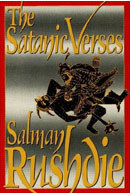|
REVIEW The Satanic Verses has been attacked by many critics as incoherent, as a disorganized mixture of plots, themes, and characters. Even a cursory survey of the preceding notes reveals that Rushdie has sought to knit together the various threads of his novel by introducing a host of cross-references, repeating the names of characters, catch phrases, and images in a complex network of allusions and echoes. Yet these might be viewed as desperate attempts to give a surface appearance of unity to a basically chaotic work.
I am persuaded that The Satanic Verses is indeed unified by a related set of topics, all of them widely acknowledged in earlier criticism, but perhaps not arrayed in the way I do here. This is my personal understanding of what holds the various plots of the novel together in a way that articulates a consistent world view.
Rushdie says that novels do not lay down rules, but ask questions. In fact he claims that by asking questions, good fiction can help to create a changed world. Novels like The Satanic Verses don't settle debates: they articulate the terms of debate and ask hard questions of the opposing sides, thereby helping to usher "newness" into the world. One of the unifying themes of The Satanic Verses is newness, or change. It attacks rigid, self-righteous orthodoxies and celebrates doubt, questioning, disruption, innovation. This much is obvious.
People who find themselves excluded or suppressed by dominant groups try by various means to find an effective voice and tools for action to create power and authority for themselves. It is these struggles that are the basic underlying matter of Rushdie's novel. The question that is asked throughout this novel is "What kind of an idea are you?" In other words, on what ideas, experiences, and relationships do you base your definition of yourself--your identity?
People who find themselves identified as "foreigners" or "aliens" often find unwelcome hostile identities imposed upon them. The common catch-phrase in literary theory these days is "demonization," and it is this term that Rushdie makes concrete in his novel by turning Saladin, the immigrant who is most determined to identify with the English, literally into a demon. (Of course he is also able to earn his living only by taking on the guise of a space alien.) The other immigrants who assume horns later in the novel express the same satirical view of English bigotry. But this is only the beginning of Rushdie's exploration of the theme of identity.
Less obviously vicious but still prejudicial was a later formula according to which writing about what is now called "postcolonial" literature emphasized the position of writers from the "third world" writing in English as exiles, uprooted and stranded in alien, often hostile cultures far from home, working in a language that may not have been their own. Immigrants were called "exiles" whether they had actually been driven from their homeland or--as was much more common--they had sought increased opportunity by voluntarily moving abroad. "Exile" is a weak image, and Rushdie rejects it. His immigrants are sources of energy and creativity, busily redefining the culture of their adopted homelands.
But Rushdie does not engage in this sort of caricature to privilege his immigrants as somehow morally superior. They are all morally flawed as well, though treated in a more complex manner. He is not saying that being from a former colony of Britain grants one any particular virtue; it is only that he is interested in focussing on such people. Of course he is perfectly aware that by doing so he is disorienting his "mainstream" English and American readers, giving them a taste of what it feels like to be bit players in a drama which is not essentially about them.
Further, he is not asking how immigrants can become "English" (in the way that Otto Cone strove to become English); he is instead asking how immigrants can create an identity for themselves in England which is richer, newer, more interesting than the traditional stereotypes associated with the old center of empire.
|
